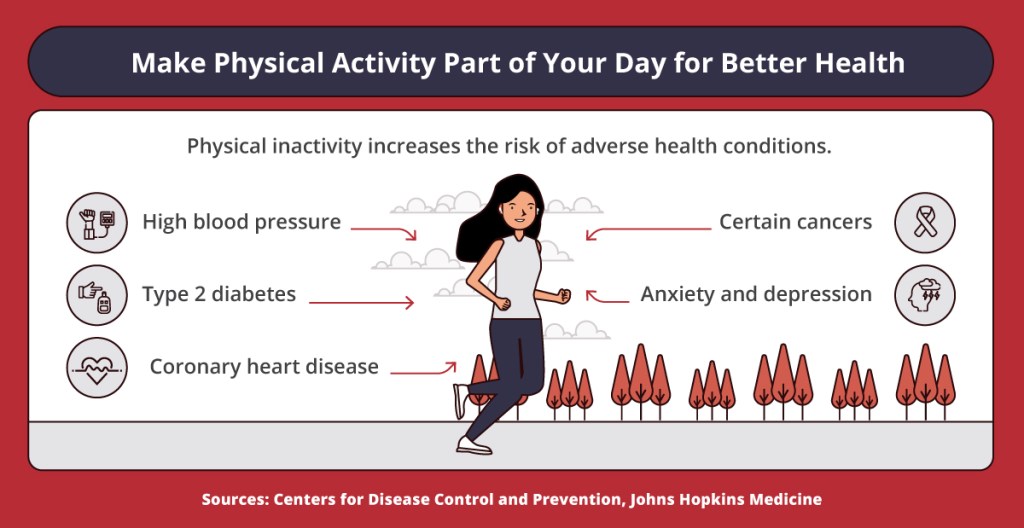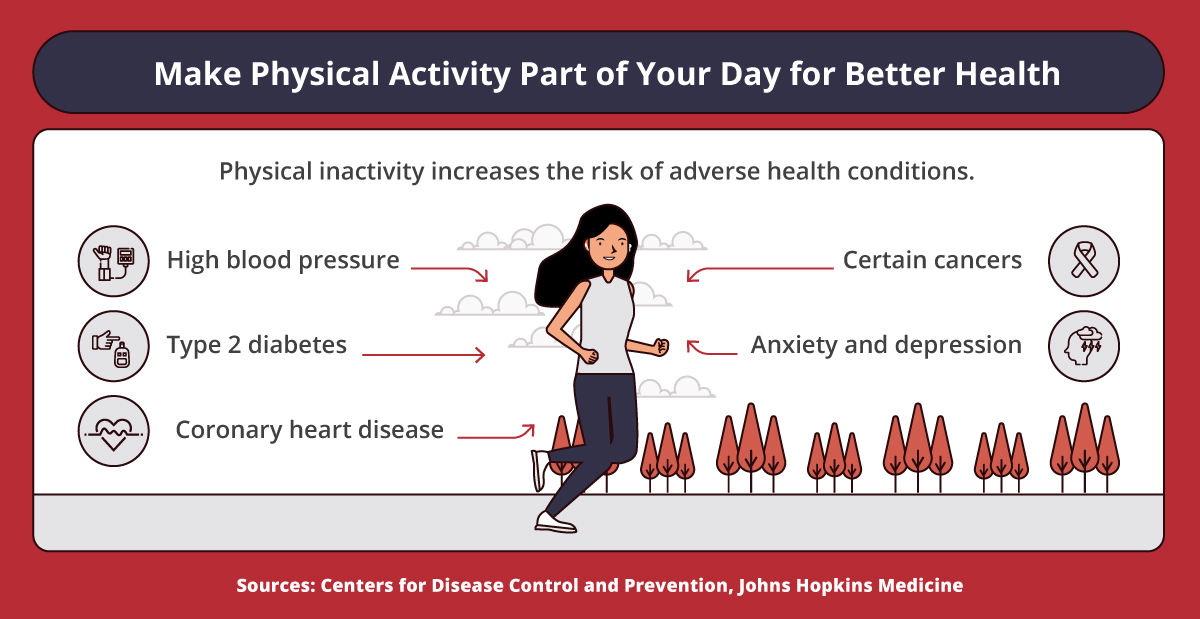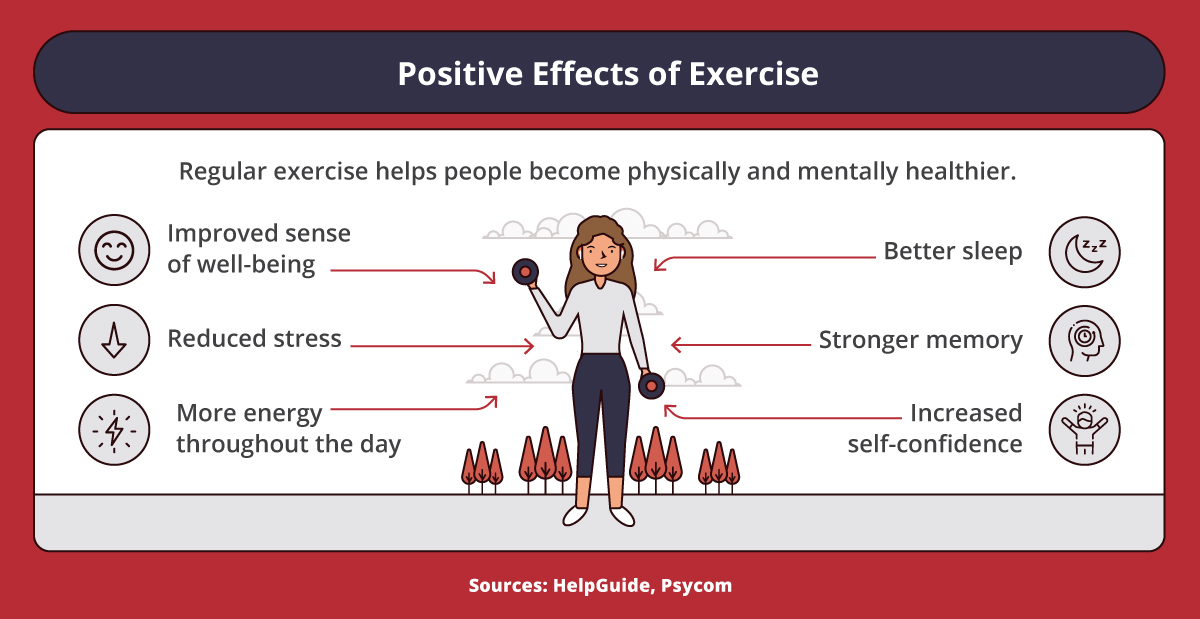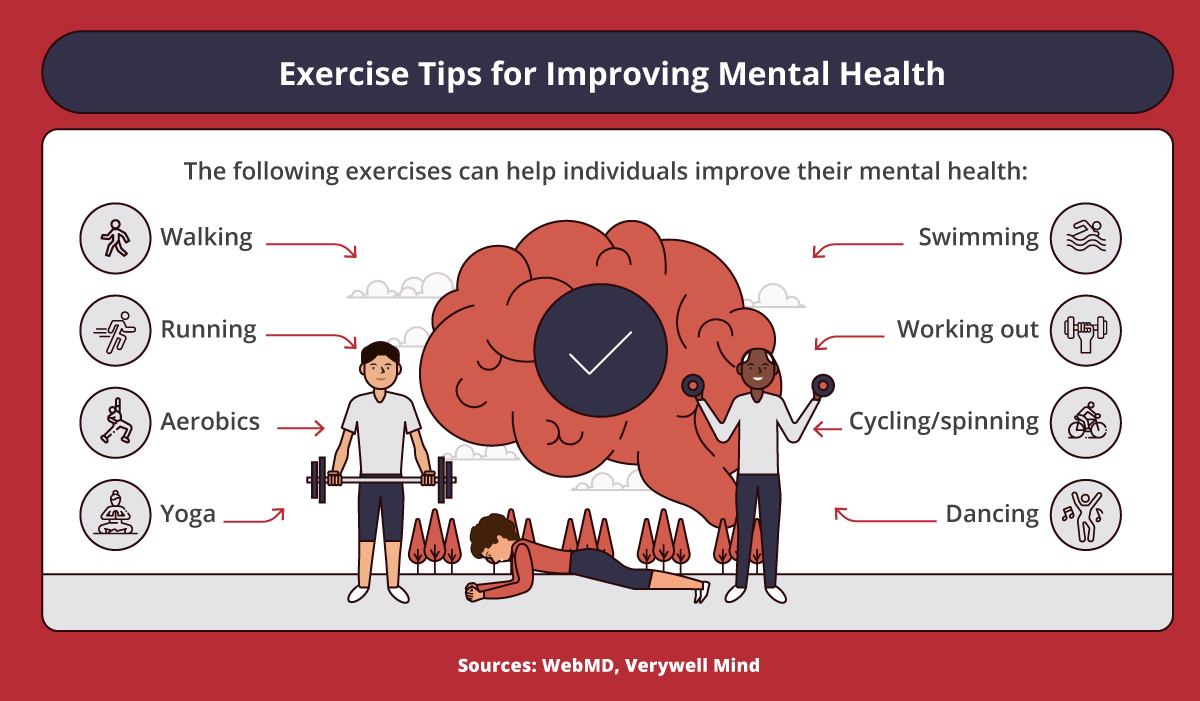Psychology of Exercise: Improvements in Mental Health

Tables of Contents
According to the Centers for Disease Control and Prevention (CDC), 15% of adults in the U.S. are physically inactive. Lack of physical activity is a contributing factor to chronic diseases such as heart disease, type 2 diabetes, various forms of cancer, and obesity. An additional risk of physical inactivity includes increased feelings of anxiety and depression, according to Johns Hopkins Medicine.
Most people know about the physical benefits of exercise, but are less aware of the psychology of exercise and how it can improve mental health outcomes. Exercise psychology is an interdisciplinary field of study focused on how physical activity and exercise create psychological responses in people. Through application of psychological principles, professionals working in the field of exercise psychology can help individuals adopt and maintain physical activity in their lives, improving their overall health and well-being.
What Is Exercise Psychology?
Exercise psychology, according to the American Psychological Association (APA), is “a discipline focused on the development and application of psychological theory for the understanding and modification or enhancement of human behavior in the sport and physical exercise environment.” Central themes in the psychology of exercise are enhancing sports performance in athletes and enhancing the health and well-being of healthy individuals or those diagnosed with a disease through physical activity and exercise. In sum, exercise psychology has a two-part focus: athlete psychology and exercise psychology.
Athlete Psychology
MLB Hall of Famer Yogi Berra once famously said, Individuals participating in sport, exercise, and physical activity for the fun of it or for health reasons can also face obstacles due to mental factors.
An exercise psychology professional can help individuals enhance their performance, physical health, and enjoyment by helping them deal with physical, mental, and emotional stress. For example, following an injury, athletes may lack the motivation to perform due to poor outcomes and frustration. An athlete psychology professional can use various tools to help athletes overcome mental barriers and restore confidence, resulting in improved performance.
Exercise Psychology
Exercise psychology can be applied to help individuals — athletes and nonathletes alike — looking to improve their mental health. Exercise psychology professionals work with individuals to understand what restricts their participation in exercise and help to maximize their participation and enjoyment of exercise and physical activity by defining individualized exercise programs. Using tools that athletes rely on to help enhance their physical performance, such as goal setting, encouragement and motivation, and mindfulness techniques, exercise psychologists help individuals improve their physical and mental health.
Positive Effects of Exercise on Mental Health
A report from the International Health, Racquet & Sportsclub Association (IHRSA) notes that 87% of randomized controlled trials found evidence of the positive impact of exercise on mental health. While the positive effects of exercise on mental health are clear, it’s also important to note the negative impact of physical inactivity:
- Less-active people have a greater risk of developing high blood pressure. According to the Mayo Clinic, exercise can help individuals lower high blood pressure and lose excess weight; excess weight is often a contributing factor to hypertension.
- Physical inactivity increases your risk of type 2 diabetes. The American Heart Association reports that regular physical activity minimizes the risk factors of diabetes. For example, a brisk 30-minute walk five days a week can help lower insulin resistance.
- Physically inactive people are more likely to develop coronary heart disease. Research published in Circulation Research indicates a correlation between sedentary behavior and cardiovascular health. Exercise can improve levels of cardiorespiratory fitness and help prevent cardiovascular chronic diseases.
- Physical inactivity can add to feelings of anxiety and depression. A key benefit of exercise for stress and anxiety is that it can help elevate depressed moods in people quickly. According to JAMA Psychiatry, a 15-minute jog every day and walking or gardening for an extended period of time could help people struggling with depression.
- The risks of certain cancers rise with physical inactivity. Evidence that the National Cancer Institute has highlighted suggests a relationship between physical activity and cancer. It reports that physical activity can help lower risk of certain cancers, including bladder, breast, and colon cancer.

According to the CDC and Johns Hopkins Medicine, physical inactivity increases the risk of adverse health conditions: high blood pressure, type 2 diabetes, coronary heart disease, certain cancers, and anxiety and depression.
There’s growing evidence on the positive effects of exercise on mental health. In 2018, The Lancet Psychiatry published the findings of a major study researching the correlation between physical exercise and mental health of 1.2 million Americans. It found that “specific types, durations, and frequencies of exercise might be more effective” in reducing mental health challenges. Additional evidence that exercise can boost mental health reports that physical activity decreased the odds of individuals becoming depressed by 26%, according to Harvard Health Publishing.
Here are a few examples of the positive impact of exercise for mental health:
- A sense of well-being. Regular exercise releases endorphins and other natural brain chemicals that can improve mood and well-being.
- Reduced Individuals can use exercise and physical activity as a coping mechanism to help take their minds off their worries and better deal with situations that increase feelings of anxiety.
- More energy throughout the day. Exercise can boost energy, helping individuals overcome mental burdens that can lower their energy levels and potentially lead to more symptoms of anxiety or depression.
- Better sleep. Mental health and sleep problems often go together. According to Harvard Health, up to 80% of psychiatric patients struggle with chronic sleep problems. However, regular physical activity can help healthy individuals sleep better.
- Improved memory. A 2020 study in Translational Sports Medicine found that a single exercise workout helped improve memory functions in young adults.
- Self-confidence. Setting and meeting exercise goals and getting into shape can help individuals feel more positive about themselves.

HelpGuide and Psycom report that regular exercise helps people become physically and mentally healthier in these ways: improved sense of well-being, reduced stress, more energy throughout the day, better sleep, stronger memory, and increased self-confidence.
Resources: Positive Effects of Exercise on Mental Health
These sources offer further information on the positive effects of exercise on mental health.
- Association for Applied Sport Psychology, About Sport & Performance Psychology: A description of how sport and performance psychology professionals can support people at every age and across various conditions.
- BetterHelp, The Top Six Mental Health Benefits Of Exercise: A medically reviewed resource about the importance of exercise in achieving mental health.
- Centers for Disease Control and Prevention, Adult Physical Inactivity Prevalence Maps by Race/Ethnicity: Data showing where adult physical inactivity, a contributor of mental health issues, is most prevalent.
- Frontiers in Psychiatry, “Beneficial Effects of Exercise on Depression and Anxiety During the Covid-19 Pandemic: A Narrative Review”: A scientific review on how exercise helped individuals struggling with depression and anxiety during the COVID-19 pandemic.
- Live Science, “Five Mental Health Benefits of Exercise”: An exploration on the impact of exercise on mental and physical health and creating cognitive improvements.
Exercise Tips for Improving Mental Health
The mental health benefits of exercise include relieving symptoms associated with depression, anxiety, and other mental health conditions. Verywell Mind reports that exercise can provide positive benefits for the brain by helping new brain cells regenerate. Exercise provides additional mental health benefits, including boosting an individual’s energy and increasing social activity.
Exercise can benefit individuals with mental health issues, such as depression, anxiety, stress, attention deficit hyperactivity disorder (ADHD), and post-traumatic stress disorder (PTSD)/trauma. For example, exercise can reduce the number of stress hormones behind anxiety and depression. Exercise also increases the following:
- Heart rate, which helps bring more oxygen to the brain, resulting in improved energy levels
- Connections in the areas of the brain that regulate emotions and perspectives of the world around you
- Levels of serotonin, dopamine, endorphins, and other neurotransmitters that help increase happiness and motivation
The types of exercise that can help individuals looking to improve their mental health include the following:
Walking
As an aerobic exercise, walking is suited to almost anyone willing to put on a pair of supportive shoes. The Anxiety and Depression Association of America (ADAA) reports that a 10-minute walk may offer similar health benefits as a 45-minute workout. Walking provides numerous mental health benefits, including improved sleep, better endurance, more energy, increased stamina, improved mood, and better cardiovascular health. In your brain, walking activates the hypothalamic-pituitary-adrenal (HPA) axis, which is responsible for stress response and therefore helps to reduce stress, according to WebMD.
Running
Ask any runner who’s experienced runner’s high and you’ll hear how invigorating a feeling it can be. This may be because running helps to release chemicals that act as stimulants. According to Johns Hopkins Medicine, “exercise increases the levels of endocannabinoids in the bloodstream.” As mood enhancing neuromodulators, these chemicals “promote short-term psychoactive effects such as reduced anxiety and feelings of calm.” Running also does wonders for the mind because it raises the level of norepinephrine in the brain. This chemical helps to moderate stress.
Yoga
Yoga combines several factors that individually and collectively help to promote mental health. This includes physical activity, measured breathing, and meditation. Psychology Today reports that yoga can benefit mental health in five ways: reducing anger, reducing anxiety, improving sleep, reducing PTSD symptoms, and improving mood. Yoga poses for mental health include Balasana (Child’s Pose), Viparita Karani (Legs Up the Wall Pose), and Uttanasana (Forward Bend Pose).
Swimming
For many, a dip in the pool represents warm, sunny weather and relaxation. It can also help individuals looking to improve their mental health. The health benefits of water-based exercise include improved mood in both men and women, according to the CDC. Swimming can also help decrease anxiety for people with fibromyalgia. According to a study in British medical journal Case Reports, open cold water swimming helped a 24-year-old woman with major depressive disorder and anxiety successfully reduce symptoms of depression and eventually allowed her to stop taking medication.
Working Out
In addition to building physical muscles, working out can help strengthen the mind. Working out can include activities such as weightlifting, high-intensity aerobic exercises, and resistance training. For example, a randomized study of young adults participating in regular weight training, according to Scientific Reports, showed that resistance exercise training can substantially reduce anxiety.
Cycling/Spinning
The physical benefits of cycling include improved muscle tone, weight loss, and better cardiovascular health. There are also clear effects of cycling on cognitive functions, including promoting attention restoration and positive emotions. Cycling has also shown to be helpful for individuals with Parkinson’s disease, according to the Davis Phinney Foundation for Parkinson’s, improving overall motor function, mood, and cognitive function, and reducing tremors and rigidity.
Dancing
Whether at a nightclub, a wedding, or a dance studio, dancing offers mental health benefits. Dancing allows individuals to temporarily escape their situation and let loose, releasing mood-boosting chemicals and decreasing symptoms of depression and anxiety. One way dancing boosts both physical and mental health in older adults is by triggering positive memories from a younger age.

According to WebMD and Verywell Mind, the following exercises can help individuals improve their mental health: walking, running, aerobics, yoga, swimming, working out, cycling/spinning, and dancing.
Resources: Exercise Tips for Improving Mental Health
These resources focus on how promoting exercise can help individuals overcome mental health issues.
- Athlete365, Expert Guide to Staying #MentallyFit: Expert advice on how athletes can cope with mental health barriers.
- Your Brain Health, “5 Simple Tips to Improve Mental Fitness”: Insights into how individuals can improve their mental fitness and reduce their chances of mental health problems.
- Cleveland Clinic, Can Sports Hypnosis Improve Performance?: An exploration of hypnotherapy in exercise routines.
- ScienceDirect, “Chapter 1 — Exercise for the Prevention and Treatment of Depression”: A study of how exercise strategies can help people with major depressive disorder.
- Team USA, “7 Mental Tips for Athletes That Can Help Us All in This Time of Uncertainty”: Mental health strategies that athletes use.
- S. Department of Homeland Security, “7 Tips for Mental Fitness”: Employees working for government agencies such as the U.S. Department of Homeland Security are often faced with stressful situations. This resource offers tips for government employees and others to improve mental health.
- Verywell Fit, “Why Positive Attitude Is Important in Sports”: A discussion of the impact of a positive attitude in maximizing athletic performance.
How Can an Exercise Psychologist Benefit You?
Exercise psychologists help individuals become motivated to adopt exercise and a healthy lifestyle and advise on the mental health benefits of exercise. Working with an exercise psychologist can help individuals:
- Adopt and maintain physical activity. An exercise psychologist can guide individuals on the types of physical activity that can help boost their mental health and encourage them to embrace and maintain a healthier lifestyle that includes exercising for mental health.
- Establish and follow up on goals. Setting goals allows individuals to work hard toward an achievement. An exercise psychologist can play a key role in establishing appropriate goals and supporting clients throughout the process.
- Work on their motivation. An exercise psychologist can help build the motivation needed to get people active. Motivation plays an important role in getting individuals to adopt and maintain an exercise regimen to promote both physical and mental health.
- Use mindfulness techniques. Distractions along the journey to physical and mental health can hamper individuals’ success in embracing a healthy lifestyle. A professional can help them to pay attention, live in the moment, accept themselves, and focus on breathing.
- Use performance enhancement techniques. Individuals may need guidance from an exercise psychologist to learn to eliminate negative thoughts and substitute them with positive self-talk, focus, and concentration. Along the way, an exercise psychologist also encourages achievements to help to boost mood and encourage performance.
Finding Balance in Your Exercise Regimen
If you or someone you know is struggling with mental health or notices a decline in cognitive abilities, the first step should always be to speak to a doctor. Adding exercise and physical activity to your life can also help reduce risk of mental illness and cognitive decline.
Working with an exercise psychologist can help individuals use exercise strategies that help to promote mental fitness. However, exercise should always be done in moderation. Too much exercise, especially if done incorrectly, can be damaging.
The guidance of a professional can help minimize injuries while helping to ensure that the maximum mental health benefits of exercise are achieved. As skilled professionals with knowledge of both the physiological and psychological benefits of exercise, exercise psychology professionals can help you find the right exercise regimen for your body and mind.
Infographic Sources
Centers for Disease Control and Prevention, “Lack of Physical Activity”
HelpGuide, “The Mental Health Benefits of Exercise”
Johns Hopkins Medicine, “Risks of Physical Inactivity”
Psycom, “Exercise for Optimal Mental Health: Here’s Why Moving Can Be as Effective as Drugs”
Verywell Mind, “The Mental Health Benefits of Physical Exercise”

